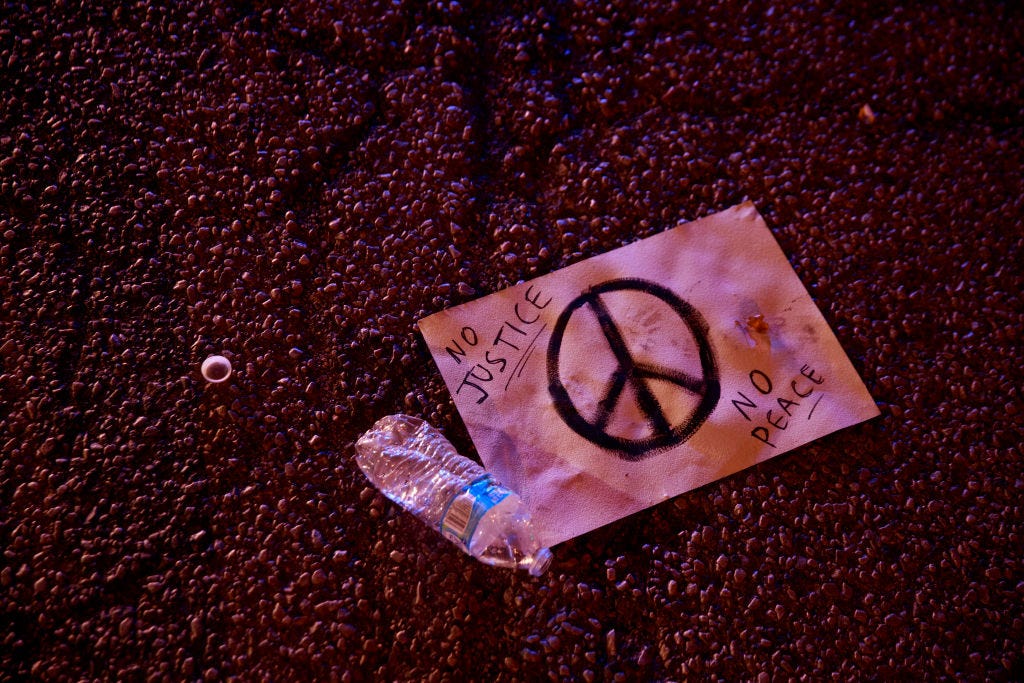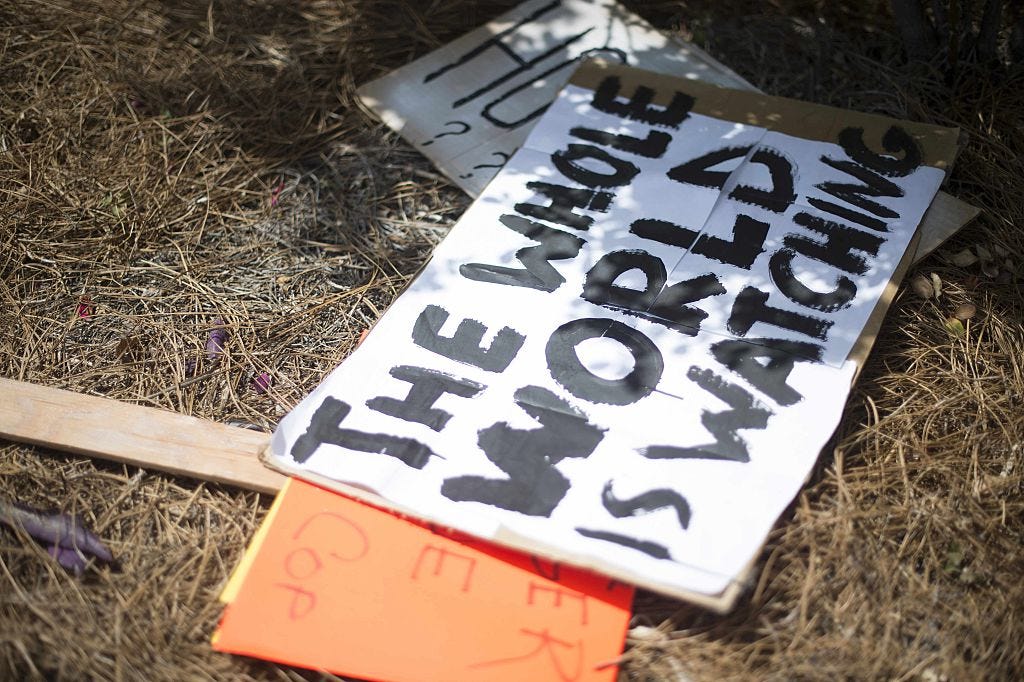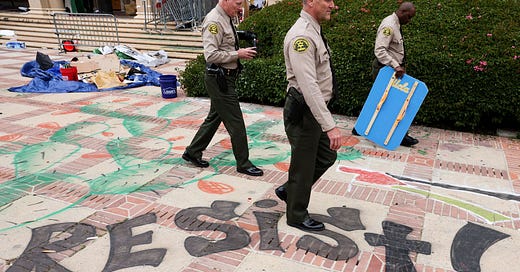
The Free Press

This article is reprinted from the Substack newsletter “The Liberal Patriot.”
It wasn’t so long ago progressives were riding high. They had a moment; they really did. Their radical views set the agenda and tone for the Democratic Party and, especially in cultural areas, were hegemonic in the nation’s discourse. Building in the teens and cresting in the early ’20s with the Black Lives Matter protests and the heady early days of the Biden administration, very few of their ideas seemed off the table. Defund the police and empty the jails? Sure! Abolish ICE and decriminalize the border? Absolutely! Get rid of fossil fuels and have a “Green New Deal”? Definitely! Demand trillions of dollars for a “transformational” Build Back Better bill? We’re just getting started! Promote DEI and the struggle for “equity” (not equal opportunity) everywhere? It’s the only way to fight privilege! Insist that a new ideology around race and gender should be accepted by everyone? Only a bigot would resist!
Progressives thought they had ripped the Overton window wide open and it remained only to push the voters through it. In their view, that wouldn’t be too hard since these were great ideas, and voters, at least the non-deplorable ones, were thirsty for a bold new approach to America’s problems.
In reality, a lot of these ideas were pretty terrible and most voters, outside the precincts of the progressive left itself, were never very interested in them. That was true from the get-go, but now the backlash against these ideas is strong enough that it can’t be ignored. As a result, politics is adjusting and the progressive moment is well and truly over.
Astute observers on the left acknowledge this, albeit with an undertone of sadness. Progressive Substacker Noah Smith plaintively notes:
I spent pretty much all of the 2010s—my first decade as a writer and pundit—advocating for various progressive causes. . . . In the late 2010s, it felt like a long wave of progressive sentiment. . . had finally reached a critical level of intensity. . . .
A few years later, I’m not so sure. My values haven’t become more conservative. . . . But I have to say that I now doubt the practical effectiveness of some of the policies I embraced in previous years.
Andrew Prokop of Vox, laments:
Ambitious progressive rallying cries of just a few years ago, such as defunding the police and Medicare for All, are now absent from the discourse. Politicians who assiduously cultivated left activists are now increasingly tacking to the center—most notably Vice President Kamala Harris, who has abandoned many of the positions she took while running in the Democrats’ 2020 presidential primary.
Finally, David Weigel of Semafor observes in his recent article, “No Matter Who Wins, the U.S. Is Moving to the Right”:
The Democratic Party, after two decades of leftward post-Clinton drift, has jerked abruptly right. . . . They’ve adjusted to an electorate that’s shifted to the right, toward the Trump-led GOP, on issues that progressives once hoped were non-negotiable—immigrant rights, LGBTQ rights, climate change policies, and criminal justice reform. . . .
Both parties now face voters, white and non-white, who were open to some left-wing ideas about race, crime, and gender in 2020 but are far more skeptical now.
So how did the progressive moment fall apart? It is not hard to think of some reasons.
1. Loosening restrictions on illegal immigration was a terrible idea, and voters hate it. When Joe Biden came into office, he immediately issued a series of executive orders loosening the rules for handling illegal immigrants, a move that was rapturously applauded by progressives. The real-world effects were immediate, as New York Times reporter Miriam Jordan crisply explained:
It is not just because they believe they will be able to make it across the 2,000 mile southern frontier. They are also certain that once they make it to the United States they will be able to stay.
Forever.
And by and large, they are not wrong.
The predictable result of this dramatic surge in illegal immigration and the diffusion of these immigrants into overburdened cities was a spike in both the salience of the issue and of negative sentiment toward Biden and the Democrats for letting the situation get out of control. This has resulted in huge advantages for Trump and the Republicans, which have continued even as the Biden administration finally moved in mid-2024 to tighten the border and candidate Harris runs commercials promising to be tough on border security.
The Democrats should have seen this coming. Contrary to the claims of progressive advocates, border security is a huge issue that cannot be elided in any attempt to change or “humanize” the immigration system. Public opinion polling over the years has consistently shown overwhelming majorities in favor of more emphasis on border security.
It should therefore have been obvious that any moves toward greater leniency at the border raised the possibility of knock-on effects and unintended consequences that would be highly unpopular. And now voters are increasingly open to draconian immigration restriction measures. An astonishing 62 percent of voters in a June CBS News survey supported starting “a new national program to deport all undocumented immigrants currently living in the U.S. illegally,” including 47 percent of blacks, 58 percent of white college graduates, and even 53 percent of Hispanics.
“Americans simply do not like the practice of rewarding asylum seekers for crossing the border illegally,” writes Smith. Progressives’ epic failure to understand this reality is a big reason why the progressive moment is over.
2. Promoting lax law enforcement and tolerance of social disorder was a terrible idea, and voters hate it. In the aftermath of the police killing of George Floyd, the climate for police and criminal justice reform was highly favorable. But Democrats, taking their cue from progressives, blew the opportunity by allowing the party to be associated with unpopular movement slogans like “defund the police” that did not appear to take public safety concerns very seriously.
At the same time, Democrats became associated with a wave of progressive public prosecutors who seemed hesitant about keeping criminals off the street, even as a spike in violent crimes such as murder and carjacking swept the nation. This was twinned with non-prosecutions for lesser crimes that degraded the quality of life in many cities under Democratic control. San Francisco practically became the poster child for the latter problem under District Attorney Chesa Boudin’s “leadership.”
The most enthusiastic supporters of a Boudin-style approach to policing tend to be white, college-educated liberals—the base, as it were, of the progressive movement. The sentiment among pro-Democratic, non-white, and working-class voters toward policing is quite different. These voters tend to live in areas that have more crime and are therefore unlikely to look kindly on any approach that threatens public safety. A Pew poll found that black and Hispanic Democrats—who are far more urban and working class—are significantly more likely than white Democrats to favor more police funding in their area.
A survey conducted for my new report with Yuval Levin, Politics Without Winners, confirmed the strength of these sentiments. By 73–25 percent, they backed keeping police budgets whole in the interests of public safety over reducing these budgets and transferring money to social services. Among non-white working-class voters there was a 30-point margin against reducing police budgets, which ballooned to 50 points among moderate-to-conservative working-class non-whites, the overwhelming majority of this demographic. By contrast, white college-grad liberals favored reducing police budgets by 20 points. That tells you a lot.
As Smith apologetically admits: “The simple fact is that policing works.” Who’da thunk it? Progressives own this one, and it is another big reason the progressive moment is over.

3. Insisting that everyone should look at all issues through the lens of identity politics was a terrible idea, and voters hate it. In recent years, huge swaths of the Democratic Party, egged on by progressives, have become infected with an ideology that judges actions or arguments not by their content but rather by the identity of those engaging in them. Those identities in turn are defined by an intersectional web of oppressed and oppressors, of the powerful and powerless, of the dominant and marginalized. With this approach, one judges an action not by whether it’s effective or an argument by whether it’s true, but rather by whether the people involved are in the oppressed/powerless/marginalized group or not. If they are, the actions or arguments should be supported; if not, they should be opposed.
This approach is in obvious contradiction to logic and common sense. And it led much of the Democratic Party to take positions that have little purchase in social or political reality and are offensive to the basic values most Americans hold. Take the vogue for “anti-racist” posturing. This dates back to the mid-teens and gathered overwhelming force in 2020 with the George Floyd police killing and subsequent nationwide protests. It became de rigueur in Democratic circles to solemnly pronounce American society structurally racist and shot through with white supremacy from top to bottom. Ibram X. Kendi was treated as an unimpeachable sage whose pronouncements like “The only remedy to racist discrimination is anti-racist discrimination” had to be embraced.
But most voters don’t believe that. Rather, they believe that racial preferences are not fair, and fairness is a fundamental part of their world outlook. They believe, with Martin Luther King Jr., that people should “not be judged by the color of their skin but by the content of their character.” In a 2023 Public Agenda Hidden Common Ground survey, 91 percent of respondents agreed with the statement: “All people deserve an equal opportunity to succeed, no matter their race or ethnicity.” This is what people deeply believe in: equal opportunity, not—unlike the intersectional ideology promoted by progressives—equal outcomes.
In contrast, consider the issue of “structural racism.” Is racism “built into our society, including into its policies and institutions,” as progressives maintain, or does racism “come from individuals who hold racist views, not from our society and institutions”? In the Politics Without Winners survey, moderate-to-conservative, non-white, working-class voters (70 percent of whom are moderate, not conservative) chose the latter view by 61 to 39 percent. Hispanic voters as a whole have essentially the same view. In stark contrast, the comparatively tiny group of non-white liberal college graduates favored the structural racism explanation by 78 to 20 percent. White college-graduate liberals, the shock troops of the progressive movement, were even more lopsided at 82 to 18 percent. That tells you a lot about who has influenced the Democratic Party on racial issues—and is another big reason the progressive moment is over.

4. Telling people fossil fuels are evil and they must stop using them was a terrible idea, and voters hate it. Since the days of Barack Obama and an “all of the above” approach to energy production, progressives have embraced a radical approach to energy issues. They promulgated the view that climate change is not gradually advancing, but is already a crisis evident in extreme weather events. It threatens the existence of the planet without immediate, drastic action. That action must include the immediate replacement of fossil fuels by renewables, which are cheap and can be introduced right now with sufficient resources.
According to the progressive view, people resist rapidly eliminating fossil fuels only because of propaganda from the fossil fuel industry. Potential problems with renewables, such as their intermittency, are being solved, they argue. This means that as we use more renewables and cut out fossil fuels, political support for the transition to clean energy should rise because of the benefits to consumers, who will have cheaper energy costs, and to workers, who will have high-paying clean energy jobs.
Pretty much every sentence in this catechism is highly debatable. But the catechism is not to be questioned, progressives insist. Biden echoed their apocalyptic rhetoric in 2023:
[T]he only existential threat humanity faces, even more frightening than a nuclear war, is global warming going above 1.5 degrees in the next 20 to 10 years. That’d be real trouble. There’s no way back from that.
This is the gospel for progressives who see themselves as noble warriors against the impending apocalypse. But most voters, especially working-class voters, have not signed up for—or are even much interested in—the rapid green transition they envision.
Workers far prefer a gradual “all-of-the-above” approach to transitioning the energy system over the frantic push for renewables that characterizes progressives’ Green New Deal–type thinking. In our Politics Without Winners survey, we asked respondents whether they thought the country’s energy supply should “use a mix of energy sources including oil, coal, and natural gas along with renewable energy sources,” or “phase out the use of oil, coal, and natural gas completely, relying instead on renewable energy sources such as wind and solar power only.” An overwhelming 72 percent in the survey favored the all-of-the-above approach, while just 26 percent backed the rapid renewables transition. Views were even more lopsided among working-class voters.
Predictably, progressives’ BFFs, white liberal college graduates, were an exception—two to one in favor of getting rid of fossil fuels. But moderate and conservative white college graduates, who vastly outnumber the liberals, were almost seven to one against.
The hard fact is that progressives’ hostility to fossil fuels is not widely shared by ordinary voters. In a recent result from a New York Times/Siena College poll, two-thirds of likely voters said they supported a policy of “increasing domestic production of fossil fuels such as oil and gas.”
Two-thirds!
A new NBC poll tested a wide range of policy proposals to see whether voters would be more or less likely to support a candidate who espoused them. The single most positive response among voters was to a proposal to expand domestic oil and natural gas production. By a very wide 67 to 15 percent margin, voters said they would be more likely to support a candidate who wanted to expand fossil fuel production.
Voters clearly aren’t buying what progressives are selling on energy and climate. Not even close. And that’s another big reason the progressive moment has come to an end.
What comes next? Certainly Kamala Harris is furiously backpedaling from all these positions, but she is not a particularly convincing messenger for a new approach or even able to articulate what that new approach might be. In all likelihood, it will take some time for a new moment to emerge and influence Democrats the way the progressive moment did. Until then, Democrats are stuck with the fallout from the progressive moment, which may fatally undermine them this November 5. We shall see very shortly.
Ruy Teixeira is a senior fellow at the American Enterprise Institute, a contributing writer at The Washington Post, and the co-founder and politics editor of the Substack newsletter The Liberal Patriot. His new book, with John B. Judis, is Where Have All the Democrats Gone?




